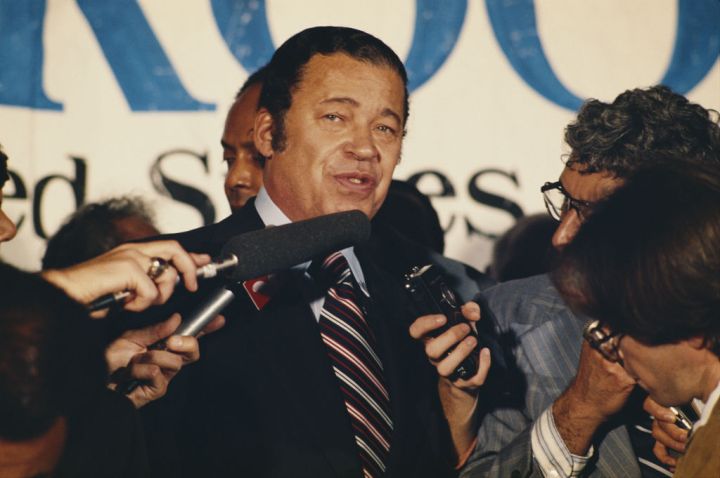Here’s Every Black US Senator In American History

Circa 1870, from left: Sen. Hiram Revels of Mississippi with some of the first Black members of Congress, Benjamin Turner, Robert De Large, Josiah Walls, Jefferson Long, Joseph Rainey and Robert Brown Elliot. | Source: MPI / Getty
It may be hard for some folks to fully comprehend this, but in the entire 231 years that the U.S. Senate has existed, there have only been 10 senators who are Black. All but three of them were elected and just two of that already small number are women.
As of Tuesday morning, there were three sitting U.S. Senators who are Black.
It was already known since last month that figure was going to decrease by one when California Sen. Kamala Harris and her running mate Joe Biden won the presidential election, making her the first Black vice president in American history.
But it was not known who would fill her vacated Senate seat — until Tuesday afternoon when California Gov. Gavin Newsom appointed Alex Padilla, the California Secretary of State.
Before the announcement, Newsome had been facing pressure to name a Black woman to succeed Harris in the Senate. After all, there were already several Latino Senators. Without Harris, there was just one Black Senator who is a democrat and another who is a Republican. But no Black woman, a void that was glaring to critics of Newsom’s decision. It seemed logical — especially during a calendar year marked by national protests that were part of a larger racial reckoning — that Newsom would not only select a Black person, but also a Black woman to fill the seat.
To be sure, the ensuing debate following Newsom’s decision had everything to do with the absence of a Black woman in the U.S. Senate and nothing to do with the fact that Padilla would be the first Latino to represent California in the U.S. Senate. It had to do with the representation of Black people in the U.S. Senate, something that has historically been all but a novelty, even in the year 2020.
Only in recent years has the election of Black candidates to the U.S. Senate picked up steam.

Circa 1883: Head-and-shoulders portraits of “Distinguished Colored Men” Frederick Douglass, Robert Brown Elliott, U.S. Sen. Blanche K. Bruce, William Wells Brown, Md., Prof. R.T. Greener, Rt. Rev. Richard Allen, J.H. Rainey, E.D. Bassett, John Mercer Langston, P.B.S. Pinchback and Henry Highland Garnet. | Source: Buyenlarge / Getty
It’s been 150 years since the first Black person was elected to the U.S. Senate, with another following four years later in 1874.
But it would be more than 90 years later until the next Black man was elected to the U.S. Senate.
It would be another quarter of a century until the next Black person — the first Black woman — would win a Senate election.
A little more than a decade later, America got its next Black Senator — one who would notably go on to become the first Black person elected president of the United States.
That seemingly opened the relative floodgates to usher in a historic era that would include four more Black U.S. Senators, culminating with two of whom had legitimate runs for the White House.
With the next round of U.S. Senate elections already coming up soon in the 2022 mid-term elections, who will be next to join the exclusive club of Black Senators? The Rev. Raphael Warnock is currently engaged in a heated runoff election in Georgia that would make him the first Black Senator from the Peach State.
Ahead of that election, scroll down to better acquaint yourselves with every Black U.S. Senator in American history, in chronological order.
1. Hiram Rhoades Revels
 Source:GettyHiram Rhoades Revels (1822-1901), an African American clergyman was the first Black person to be elected to the United States Senate. He was elected in 1870 in Mississippi after Reconstruction but only served two years.
Source:GettyHiram Rhoades Revels (1822-1901), an African American clergyman was the first Black person to be elected to the United States Senate. He was elected in 1870 in Mississippi after Reconstruction but only served two years.
2. Blanche K. Bruce
 Source:GettyBlanche K. Bruce, who was the Accessor and Sheriff of Bolivar County, Mississippi, was elected to the U.S. Senate in 1874. He was the first African American to serve a full term in the Senate. He, like Revels, was elected by the state legislature.
Source:GettyBlanche K. Bruce, who was the Accessor and Sheriff of Bolivar County, Mississippi, was elected to the U.S. Senate in 1874. He was the first African American to serve a full term in the Senate. He, like Revels, was elected by the state legislature.
“Bruce focused on a number of state and national issues including the construction of levees along the Mississippi River, the development of a more humane and equitable federal Indian policy and the desegregation of the United States Army,” according to the Black Past website. “However one of his most memorable addresses in Congress occurred in March 1876 when he called for a Senate investigation of the racial and political violence that marked the Mississippi gubernatorial election of 1875.”
3.
Blanche K. Bruce
 Source:GettyFormer United States Senator from Massachusetts, Edward Brooke III (1919 – 2015) after conceding victory to the challenger, Paul Tsongas, 7th November 1978.
Source:GettyFormer United States Senator from Massachusetts, Edward Brooke III (1919 – 2015) after conceding victory to the challenger, Paul Tsongas, 7th November 1978.
He was elected senator of Massachusetts as a Republican in 1966. He was the first Black senator elected since Reconstruction. He was also the first African American elected to the Senate by popular vote.
4. Carol Moseley Braun
 Source:GettyCarol Moseley Braun, of Illinois, was elected to the U.S. Senate in 1992 and served a single term. She was the first Black woman elected to the U.S. Senate.
Source:GettyCarol Moseley Braun, of Illinois, was elected to the U.S. Senate in 1992 and served a single term. She was the first Black woman elected to the U.S. Senate.
Pictured: U.S. Senator-elect Carol Moseley Braun declares her victory on Nov. 3, 1992, in Chicago. She called her campaign a step toward a new diversity in government.
5. Barack Obama
 Source:GettyBarack Obama, of Illinois, was elected to the United States Senate in 2004, making him the fifth Black person to serve in the Senate.
Source:GettyBarack Obama, of Illinois, was elected to the United States Senate in 2004, making him the fifth Black person to serve in the Senate.
Notably, he would go on to become the first Black president of the United States after serving only a portion of his first and only term in the U.S. Senate.
6. Roland Burris
 Source:GettyIn 2009, Senate Democrats grudgingly accepted embattled then-Illinois Gov. Rod Blagojevich’s hand-selected Senate appointee, Roland Burris, as they sought to break an impasse over then-President-elect Barack Obama‘s former seat.
Source:GettyIn 2009, Senate Democrats grudgingly accepted embattled then-Illinois Gov. Rod Blagojevich’s hand-selected Senate appointee, Roland Burris, as they sought to break an impasse over then-President-elect Barack Obama‘s former seat.
But the appointment was mired in controversy in a so-called “pay to play” scheme that resulted in an investigation into bribery in exchange for Obama’s former Senate seat.
Burris was never punished, but Blagojevich was impeached, driven from office after he was accused of trying to sell the Senate seat and ultimately convicted and sentenced to prison.
He served in the Senate until late November 2010 when his successor was chosen in a special election.
7. Tim Scott
 Source:GettyTim Scott in 2013 became the first African American since Reconstruction to represent a southern state in the Senate. The Republican was appointed to the U.S. Senate during his first term as a member of the U.S. House of Representatives. He was officially elected in a special election in 2014 and then re-elected to his current term in 2016.
Source:GettyTim Scott in 2013 became the first African American since Reconstruction to represent a southern state in the Senate. The Republican was appointed to the U.S. Senate during his first term as a member of the U.S. House of Representatives. He was officially elected in a special election in 2014 and then re-elected to his current term in 2016.
Scott has emerged as a villain of sorts by consistently siding against the best interests of Black America, including most recently trying to convince voters that Donald Trump is not racist.
Pictured: Sen. Scott at the South Carolina Inland Port groundbreaking ceremony in Greer, S.C., on March 1, 2013.
8. William “Mo” Cowan
 Source:GettyWilliam “Mo” Cowan was named interim U.S. Senator of Massachusetts on Jan. 30, 2013. Then a senior advisor to Gov. Deval Patrick, Cowan filled the position until a successor was named for departing Sen. John Kerry, who was named Secretary of State for Obama’s presidential administration.
Source:GettyWilliam “Mo” Cowan was named interim U.S. Senator of Massachusetts on Jan. 30, 2013. Then a senior advisor to Gov. Deval Patrick, Cowan filled the position until a successor was named for departing Sen. John Kerry, who was named Secretary of State for Obama’s presidential administration.
Cowan served for less than a year until July 15, 2013.
9. Cory Booker
 Source:GettyCory Booker became New Jersey’s first Black U.S. Senator after winning a special election in 2013. He was elected to a full term in 2014 and re-elected to another this past November following an unsuccessful presidential campaign.
Source:GettyCory Booker became New Jersey’s first Black U.S. Senator after winning a special election in 2013. He was elected to a full term in 2014 and re-elected to another this past November following an unsuccessful presidential campaign.
Pictured: Senate Judiciary Committee member Sen. Booker delivers remarks about Supreme Court nominee Judge Brett Kavanaugh during a mark up hearing in the Dirksen Senate Office Building in Washington, D.C.., on Sept. 28, 2018.
10. Kamala Harris
 Source:GettyKamala Harris became the first Black person — man or woman — to serve as U.S. Senator for the state of California. She was elected in 2016. Her inaugural term was cut short after she was elected the first Black vice president of the United States as Joe Biden’s running mate in 2020.
Source:GettyKamala Harris became the first Black person — man or woman — to serve as U.S. Senator for the state of California. She was elected in 2016. Her inaugural term was cut short after she was elected the first Black vice president of the United States as Joe Biden’s running mate in 2020.
Pictured: Sen. Harris questions Attorney General William Barr as Barr testifies before the Senate Judiciary Committee at the Dirksen Building in Washington, D.C., on May 1, 2019.



